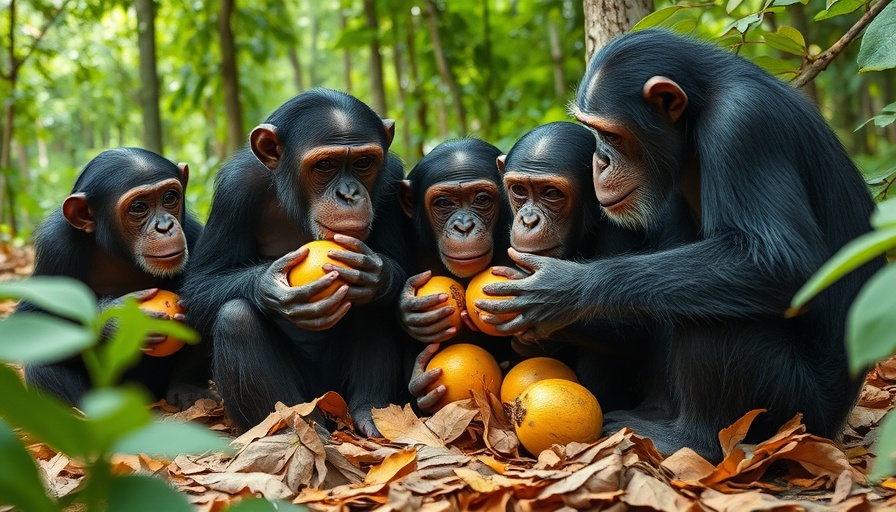
Chimpanzees' Surprising Alcohol Connection
In a fascinating addition to our understanding of wildlife behavior, wild chimpanzees have been seen partaking in the consumption and sharing of fermented fruits, specifically African breadfruit. This behavior was captured on cameras set up by researchers in Guinea-Bissau’s Cantanhez National Park, revealing a side of these primates that has implications for both their social dynamics and evolutionary history.
The Science Behind Alcohol and Chimpanzees
According to lead author Anna Bowland, a PhD student at the University of Exeter, the analysis of the chimpanzees showed they consumed fermented fruit containing alcohol levels that were relatively low—up to 0.61% Alcohol By Volume, which is much less than what most alcoholic beverages contain. This suggests that while the chimps are not getting drunk, they might still derive some benefits from the shared experience.
Bowland noted parallels between how humans respond to alcohol—with dopamine and endorphin release leading to feelings of happiness and relaxation—and how chimpanzees might experience similar emotional responses from sharing alcoholic fruits. The act of sharing alone could strengthen social bonds in chimpanzee communities, echoing human social practices that incorporate feasting and sharing food.
What This Means for Chimpanzee Social Structures
The study indicates that such sharing behaviors might not be commonplace among chimpanzees, providing a unique insight into their social interactions. Co-author Dr. Kimberley Hockings emphasized that this particular sharing of fermented fruit is significant because it does not happen every day and could signify important social rituals among the species.
Moreover, given that a substantial part of the chimpanzee diet consists of fruit, the cumulative effects of low alcohol presence in various food sources raise intriguing questions about their evolutionary adaptations. Does this behavior highlight how fermented fruit consumption could have played a role in the social structures of ancient hominoids?
Ecological Implications and Future Research Directions
This discovery could have broader implications for understanding the dietary habits of wild primates, potentially influencing how we approach the conservation and study of their habitats. While the current understanding of how alcohol affects chimpanzee metabolism is limited, further research could illuminate the evolutionary significance of this behavior.
Additionally, with findings noting that trees producing T. africana fruit are widespread across Africa, there is potential for these interactions to be a common phenomenon among various chimpanzee populations.
Connecting Human and Animal Behavior
While this study sheds light on chimpanzees, it also prompts reflection on human behaviors tied to food and socialization. Just as chimpanzees partake in acts of sharing for bonding, humans across cultures have traditions surrounding shared meals and beverages that enhance social connections. This shared thread in behavior across species presents a compelling intersection worth further exploration.
As we delve deeper into animal behavior, understanding the emotional and social complexities of chimpanzees offers us a mirror through which we can reflect on our relationships and the traditions we hold dear. This research opens the door not only for insights into chimpanzee social lives but also for a deeper appreciation of how intertwined our lives are with the natural world.
 Add Row
Add Row  Add
Add 



Write A Comment